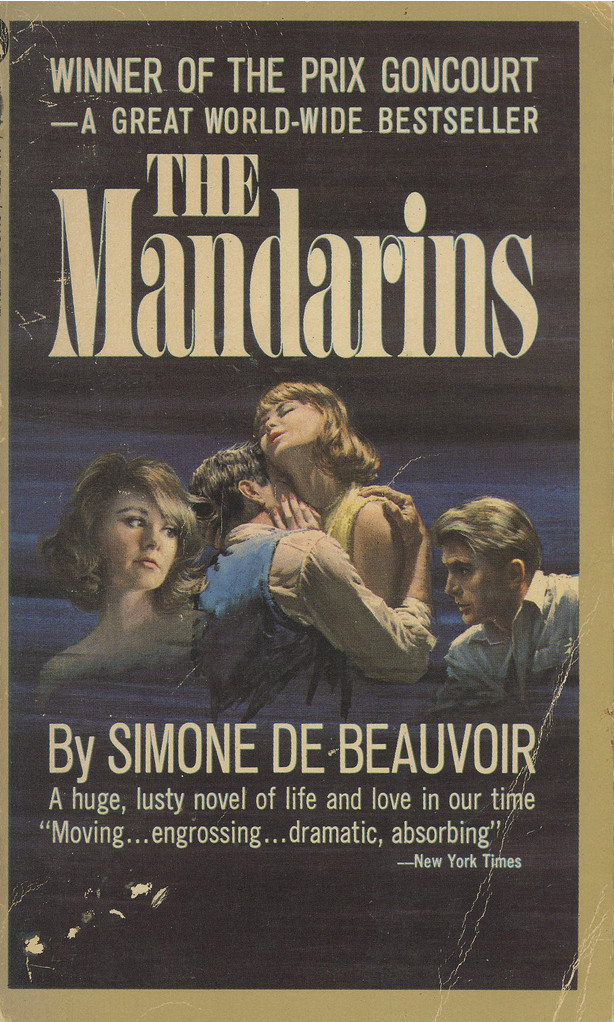Simone de Beauvoir: The Mandarins (1954–) [EN, ES, RU]
Filed under fiction | Tags: · 1940s, 1950s, existentialism, feminism, france, paris, philosophy, politics

In her famous novel, The Mandarins, Simone de Beauvoir takes an unflinching look at Parisian intellectual society at the end of World War II. In fictionally relating the stories of those around her – Jean-Paul Sartre, Albert Camus, Arthur Koestler, Nelson Algren – de Beauvoir dissects the emotional and philosophical currents of her time. At once an engrossing drama and an intriguing political tale, The Mandarins is the emotional odyssey of a woman torn between her inner desires and her public life.
First published in French as Les Mandarins, Gallimard, 1954
English edition
Translated by Leonard M. Friedman
First published in English in 1956
Publisher Harper, London, 2005
With an Introduction by Doris Lessing
ISBN 0007203942
The Mandarins (English, trans. Leonard M. Friedman, 1956/2005, EPUB)
Los Mandarines (Spanish, PDF’d HTML)
Мандарины (Russian, trans. Наталья Полторацкая and Нина Световидова, 2005)
Geoff Waite: Nietzsche’s Corps/e: Aesthetics, Politics, Prophecy, or, the Spectacular Technoculture of Everyday Life (1996)
Filed under book | Tags: · aesthetics, communism, esotericism, everyday, left, life, philosophy, politics

“Appearing in 1996 between two historical touchstones—the alleged end of communism and the 100th anniversary of Nietzsche’s death—this book offers a provocative hypothesis about the philosopher’s afterlife and the fate of leftist thought and culture. At issue is the relation of the dead Nietzsche (corpse) and his written work (corpus) to subsequent living Nietzscheanism across the political spectrum, but primarily among a leftist corps that has been programmed and manipulated by concealed dimensions of the philosopher’s thought. If anyone is responsible for what Geoff Waite maintains is the illusory death of communism, it is Nietzsche, the man and concept.
Waite advances his argument by bringing Marxist—especially Gramscian and Althusserian—theories to bear on the concept of Nietzsche/anism. But he also goes beyond ideological convictions to explore the vast Nietzschean influence that proliferates throughout the marketplace of contemporary philosophy, political and literary theory, and cultural and technocultural criticism. In light of a philological reconstruction of Nietzsche’s published and unpublished texts, Nietzsche’s Corps/e shuttles between philosophy and everyday popular culture and shows them to be equally significant in their having been influenced by Nietzsche—in however distorted a form and in a way that compromises all of our best interests.
Controversial in its “decelebration” of Nietzsche, this remarkable study asks whether the postcontemporary age already upon us will continue to be dominated and oriented by the haunting spectre of Nietzsche’s corps/e. Philosophers, intellectual historians, literary theorists, and those interested in western Marxism, popular culture, Friedrich Nietzsche, and the intersection of French and German thought will find this book both appealing and challenging.”
Publisher Duke University Press, 1996
ISBN 0822317192, 9780822317197
xii+564 pages
Review: Douglas Kellner (Illuminations, (2)), Ricardo Dominguez (Thing, 1996), Carl Pletsch and James A. Winders (Modernism/modernity, 1998), Tracy B. Strong (New Nietzsche Studies, 1998), Paul Bishop (Modern Language Rev, 1999), Richard E. Joines (Rethinking Marxism, 2001, (2)).
See also Pierre Klossowski’s Nietzsche and the Vicious Circle (1969–)
Comment (0)François Cusset: French Theory: How Foucault, Derrida, Deleuze, & Co. Transformed the Intellectual Life of the United States (2003–) [FR, EN]
Filed under book | Tags: · deconstruction, feminism, france, history, history of philosophy, literary theory, marxism, philosophy, politics, postmodern, poststructuralism, structuralism, theory, united states

“During the last three decades of the twentieth century, a disparate group of radical French thinkers achieved an improbable level of influence and fame in the United States. Compared by at least one journalist to the British rock ‘n’ roll invasion, the arrival of works by Michel Foucault, Jacques Derrida, Jean-François Lyotard, Jean Baudrillard, Gilles Deleuze, and Félix Guattari on American shores in the late 1970s and 1980s caused a sensation.
Outside the academy, “French theory” had a profound impact on the era’s emerging identity politics while also becoming, in the 1980s, the target of right-wing propagandists. At the same time in academic departments across the country, their poststructuralist form of radical suspicion transformed disciplines from literature to anthropology to architecture. By the 1990s, French theory was woven deeply into America’s cultural and intellectual fabric.
French Theory is the first comprehensive account of the American fortunes of these unlikely philosophical celebrities. François Cusset looks at why America proved to be such fertile ground for French theory, how such demanding writings could become so widely influential, and the peculiarly American readings of these works. Reveling in the gossipy history, Cusset also provides a lively exploration of the many provocative critical practices inspired by French theory. Ultimately, he dares to shine a bright light on the exultation of these thinkers to assess the relevance of critical theory to social and political activism today—showing, finally, how French theory has become inextricably bound with American life.”
Publisher La Découverte, Paris, 2003
ISBN 2707146730
373 pages
English edition
Translated by Jeff Fort, With Josephine Berganza and Marlon Jones
Publisher University of Minnesota Press, 2008
ISBN 0816647321, 9780816647323
388 pages
Reviews: Jennifer Ferng (Leonardo), Juliet J. Fall (Foucault Studies), Ethan Kleinberg (NPDR), Bridie Lonie (Junctures, FR).
French Theory: Foucault, Derrida, Deleuze & Cie et les mutations de la vie intellectuelle aux États-Unis. (French)
French Theory: How Foucault, Derrida, Deleuze, & Co. Transformed the Intellectual Life of the United States. (English)

